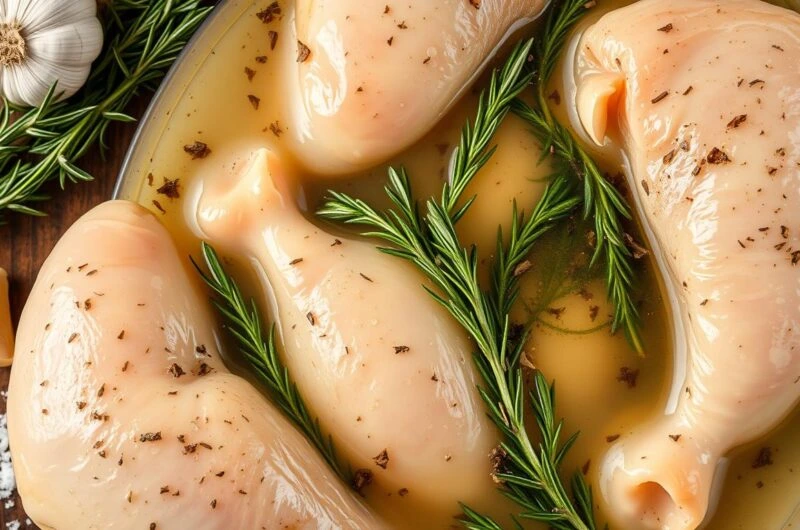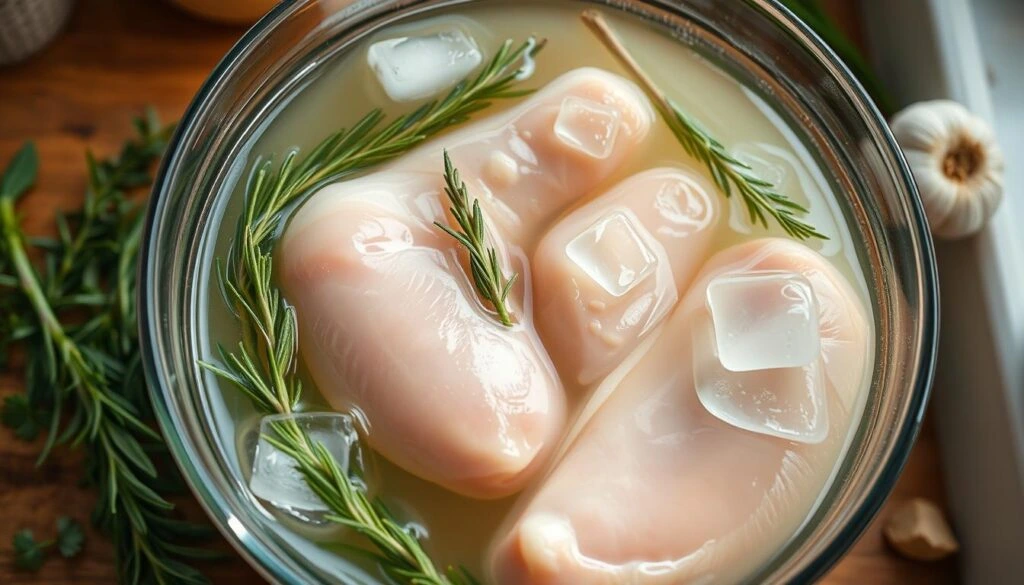Ever wondered why restaurant chicken is so juicy and tasty? The answer is brining. It’s a simple trick that makes even basic chicken breasts amazing. I’ll show you how to make chicken moist, tender, and full of flavor every time.
Table of Contents
What is Brining and Why It Matters
Brining is a method where you soak meat, like Chicken Breasts, in a salt-water mix before cooking. This simple step can greatly improve the Tender Chicken Breast. It makes the meat taste better, feel softer, and taste more enjoyable.
Definition of Brining
Brining uses osmosis to work. When you put Chicken Breasts in a brine, the meat soaks up moisture and flavors. This makes the Chicken Breasts juicier, tenderer, and more flavorful.
Benefits of Brining Chicken
- Increases juiciness and tenderness of the Chicken Breasts
- Enhances the overall flavor of the Chicken Marinade
- Helps to prevent the Chicken Breasts from drying out during cooking
- Allows the Chicken Breasts to better retain their natural moisture
Common Brining Ingredients
The basic brine mix has water, salt, and sometimes sugar. You can also add other things to make it taste even better. For example:
- Herbs (e.g., thyme, rosemary, sage)
- Spices (e.g., peppercorns, bay leaves, garlic)
- Citrus (e.g., lemon, orange, lime)
Trying different brine ingredients lets you make many flavors. This way, you can match your Chicken Marinade and Tender Chicken Breast dishes perfectly.
Essential Ingredients for Brining Chicken Breasts
Making perfect brined chicken breasts begins with picking the right ingredients. The core of a great brine is a mix of water and salt. Choose high-quality kosher salt for the best taste. It dissolves well and adds a clean flavor.
To make the Flavorful Chicken Dishes even better, add herbs and spices. Herbs like rosemary, thyme, and sage add a nice aroma. Spices like garlic, peppercorns, and bay leaves bring a strong flavor.
If you want a sweeter taste, add a bit of sugar. It balances the salt and makes the chicken’s outside caramelized. A splash of citrus, like lemon or orange juice, adds a refreshing touch.
It’s important to get the right mix of these ingredients. A good starting point is 2 cups of water, 2 tablespoons of salt, and 1 tablespoon each of sugar and lemon juice. Don’t forget to add your favorite herbs and spices. Adjusting the amounts can make your chicken breasts even more flavorful and juicy.
Step-by-Step Guide to Brining Chicken Breasts
Brining is a simple yet transformative technique that can take your Chicken Brining Techniques to new heights. By soaking chicken breasts in a saltwater solution, you can unlock a world of juiciness and flavor. Let’s dive into the step-by-step process to ensure perfectly Juicy Chicken Breast every time.
Preparing the Brine Solution
The foundation of a successful brine starts with the right ratio of salt to water. For a basic brine, dissolve 4-6 tablespoons of kosher salt in 4 cups of cold tap water. You can also add aromatic ingredients like garlic powder, herbs, or citrus zest to infuse your chicken with additional flavor.
Choosing the Right Container
Select a non-reactive container, such as a glass, ceramic, or food-grade plastic bowl, that’s large enough to fully submerge the chicken breasts. Avoid using metal containers, as they can react with the brine and impart an off-flavor.
Submerging the Chicken Breasts
Carefully place the chicken breasts in the brine, ensuring they are completely covered. If necessary, weigh down the chicken with a plate or other food-safe object to keep it submerged. For brining times exceeding 30 minutes, it’s crucial to refrigerate the container to maintain food safety.
“Brining chicken breasts can improve moisture retention, allowing the meat to hold more water, keeping it moist even when overcooked slightly.”
By following these simple steps, you’ll be well on your way to achieving the Juicy Chicken Breast you’ve been craving. Stay tuned for the next section, where we’ll explore the ideal brining duration and how to identify signs of over-brining.

How Long to Brine Chicken Breasts
Brining chicken breasts is a simple way to make them moist and flavorful. The brining time can vary based on several factors. But, following the recommended guidelines can help you get perfectly brined chicken every time.
Recommended Timeframes
For the best results, brine chicken breasts for 30 minutes to 2 hours. A 15-minute brine gives a light seasoning. A 1-hour brine is the perfect balance of flavor and juiciness.
Signs of Over-Brining
Brining chicken breasts for too long can make them too salty and spongy. Avoid brining beyond 4 hours. This can make the chicken waterlogged and change its texture.
Adjusting Time for Different Chicken Sizes
The thickness of the chicken affects the brining time. Larger, thicker pieces may need up to 2 hours. Thinner cuts might only need 30 minutes to an hour to avoid over-salting.
| Chicken Breast Thickness | Recommended Brining Time |
|---|---|
| Thin (1/2 inch) | 30 minutes |
| Medium (3/4 inch) | 1 hour |
| Thick (1 inch or more) | 2 hours |
By following these guidelines and adjusting the brining time, you can get perfectly moist and flavorful Brining Poultry every time.

Tips for Perfectly Brined Chicken Breasts
Brining makes Tender Chicken Breast juicy and flavorful. To get the best results, remember a few important tips.
Maintain Proper Salt Concentration
The right mix of water and salt is key. Use 3 cups of water for every 2 tablespoons of kosher salt or 1 tablespoon of pink Himalayan salt. Make sure the salt dissolves completely before adding the Tender Chicken Breast.
Keep the Brine Refrigerated
If you’re brining for more than 30 minutes, keep it cold. This stops bacteria from growing and keeps the Chicken Marinade safe and effective.
Avoid Cross-Contamination
Use different tools and containers for raw Tender Chicken Breast. This prevents contamination and keeps your kitchen clean. Always clean surfaces and tools after handling chicken.
Follow these tips for perfectly brined Chicken Marinade. You’ll get delicious and juicy results every time!
Rinsing and Drying Brined Chicken Breasts
After brining your chicken breasts, it’s time to get them ready for cooking. Don’t rinse the chicken; it’s not needed and can spread bacteria. Instead, dry the chicken well with paper towels to remove excess moisture.
This step is key for a crispy chicken skin, whether you grill, bake, or pan-fry.
How to Pat Dry Properly
To dry your brined chicken breasts, place them on a clean surface. Use paper towels to gently blot and press the skin, soaking up moisture. Make sure to get into all the small areas to avoid a soggy skin.
When the chicken feels dry, you’re all set for the next step.
Preparing for Cooking After Brining
After drying, let the chicken sit at room temperature for 20-30 minutes. This helps the meat relax and cook evenly. When seasoning, remember the brine has already added flavor, so use salt sparingly.
Your brined and dried chicken breasts are now ready to cook. You can grill, bake, or pan-fry them. The steps you’ve taken will help you create Flavorful Chicken Dishes that everyone will love.
Cooking Methods for Brined Chicken Breasts
Brining your chicken breasts is just the start. Now, it’s time to pick the best way to cook them. You can grill, bake, or pan-sear. Each method brings out the chicken’s flavor and tenderness in its own way.
Grilling: Tips for Perfection
Grilling makes chicken breasts charred on the outside and juicy inside. Heat your grill to medium-high. Cook the chicken for 5-7 minutes on each side, until it’s 165°F (74°C) inside. The brine keeps the chicken moist and full of flavor.
Baking: Achieving Juiciness
Baking is a low-key way to cook brined chicken breasts. Heat your oven to 450°F (232°C). Roast the chicken for 15-18 minutes, until it’s 165°F (74°C) inside. The brine helps keep the chicken juicy and tender.
Pan-Searing: A Flavorful Finish
Pan-searing adds a seared flavor to your chicken. Heat a skillet over high heat. Cook the chicken for 5-7 minutes on each side, until it’s golden. Then, finish it in a 350°F (175°C) oven until it’s 165°F (74°C) inside. This method gives you a crispy outside and a juicy inside.
Use a meat thermometer to check the chicken’s temperature, no matter how you cook it. Let it rest for 5-10 minutes before serving. This helps keep the juices inside.
Flavor Pairings for Brined Chicken Breasts
Brining your chicken breasts makes them moist and flavorful. You want to pick sauces, sides, and drinks that match these tastes. Choose options that add to the chicken’s flavor without overpowering it.
Sauces That Complement Brined Chicken
Go for light, fresh sauces that won’t hide the chicken’s taste. Here are some great picks:
- Lemon-herb sauce: It adds a bright, herbal touch.
- White wine sauce: Simple yet elegant, it highlights the chicken’s juiciness.
- Balsamic reduction: Its sweet-tart flavor pairs well with the chicken.
Side Dishes to Pair with Brined Chicken
Choose light, fresh sides to let the chicken’s flavor stand out. Here are some good choices:
- Roasted seasonal vegetables: They enhance the chicken’s natural taste.
- Quinoa or farro salad: Whole grains add nutrition and flavor.
- Fresh green salad: A simple salad lets the chicken be the main attraction.
Wine and Beverage Suggestions
For drinks, pick refreshing options that won’t clash with the chicken’s flavor. Here are some suggestions:
| Beverage | Why It Works |
|---|---|
| Sauvignon Blanc | Its bright acidity and citrus notes match the chicken well. |
| Pinot Noir | This light, fruity red wine offers a nice contrast to the chicken. |
| Herb-infused sparkling water | A non-alcoholic choice that refreshes the palate. |
By picking the right sauces, sides, and drinks, you can make a balanced and enjoyable meal. It will highlight the Flavorful Chicken Dishes and Moist Chicken Recipes you’ve made.

Troubleshooting Common Brining Issues
Brining chicken breasts can make them tender and flavorful. But sometimes, you might face unexpected problems. Don’t worry, we have the answers to your brining troubles here.
Surprise Salty Taste
If your chicken tastes too salty, it’s not a big deal. This issue is common but easy to fix. Just soak the chicken in plain water for 1-2 hours before cooking. This will remove excess salt, leaving you with Tender Chicken Breast that’s just right.
Textural Problems
Brined chicken can sometimes feel too soft or mushy. To prevent this, watch the brining time and salt amount. Try brining for less time or using less salt in your Chicken Brining Techniques next time.
Remedies for Over-Brined Chicken
Over-brined chicken can be a problem, but it’s not a lost cause. Use it in recipes with strong flavors or creamy sauces. The bold tastes or smooth sauces will balance out the salt, saving your Tender Chicken Breast.
“Brining is a game-changer for juicy, flavorful chicken breasts, but getting the perfect balance takes a bit of practice. With these troubleshooting tips, you’ll be a Chicken Brining Techniques pro in no time!”
Storing Leftover Brined Chicken Breasts
After enjoying your Brine Chicken Breasts, you might have leftovers. It’s important to store them right to keep the taste and quality. Here’s how to keep your Juicy Chicken Breast fresh and tasty.
Proper Refrigeration Techniques
Put cooked, brined chicken breasts in airtight containers in the fridge for up to 3 days. This keeps the moisture in and prevents drying. Make sure to eat the leftovers within 3 days for the best taste and texture.
Freezing Options for Brined Chicken
To store for longer, freeze your brined chicken breasts. Wrap them in plastic wrap and foil, or use freezer bags, squeezing out air. This stops freezer burn and keeps the Brine Chicken Breasts juicy. Frozen brined chicken can last up to 3 months.
Reheating for Best Results
When reheating your leftover brined chicken, do it gently to keep it moist. Use low heat, like the oven at 325°F (163°C) or the microwave. Add water or broth to prevent the Juicy Chicken Breast from drying out.
By using these easy storage and reheating tips, you can enjoy your brined chicken breasts for a long time.
Health and Safety Considerations
When brining Chicken Marinade, food safety is crucial. Let’s look at important health and safety tips for Brining Poultry.
Safe Handling of Raw Chicken
Always wash your hands with soap and water before and after touching raw chicken. Use different cutting boards for raw meat to prevent cross-contamination. Don’t wash raw chicken to avoid spreading bacteria in your kitchen.
Understanding Salt Intake
Brining can make chicken taste better and stay moist. But, watch your salt intake. If you’re on a low-sodium diet or have heart issues, talk to your doctor before eating brined foods.
When to Avoid Brining
Don’t brine pre-seasoned or kosher chicken. They’re already salty. Brining them more can make your dish too salty.
Remember these safety tips to enjoy Chicken Marinade and Brining Poultry safely. Happy cooking!
Brining Alternatives for Chicken Breasts
Brining can make chicken breasts juicy and flavorful. But, there are other ways to get great results. If you want to try something new or prefer a different method, here are some good alternatives.
Dry Brining: What You Need to Know
Dry brining, or salting, means rubbing kosher salt on the chicken breasts. Then, let them sit in the fridge for a few hours. This method makes the chicken tender and flavorful. Use 1-1/2 teaspoons of kosher salt for every pound of meat.
Other Marinating Techniques
There are other ways to marinate chicken breasts. Acidic liquids like lemon juice or vinegar can tenderize the meat. Oil-based marinades with herbs and spices add flavor. Try different mixes to find what you like best.
Flavor-Infusing without Brining
Want to skip brining? You can still make juicy chicken breasts. Rub a spice blend or fresh herbs on the meat. Or, put herbs under the skin before cooking. Buttermilk soaking is also good for tenderizing and adding flavor without too much salt.
FAQ
What is brining and why is it important for chicken breasts?
What are the key benefits of brining chicken breasts?
What are the essential ingredients for brining chicken breasts?
How do you properly prepare the brine solution for chicken breasts?
How long should you brine chicken breasts?
What are the best practices for brining chicken breasts?
Should you rinse and dry the chicken breasts after brining?
What are the best cooking methods for brined chicken breasts?
What flavors and side dishes pair well with brined chicken breasts?
How do you fix issues with overly salty or textured brined chicken breasts?
How should you store and reheat leftover brined chicken breasts?
Are there any health and safety considerations when brining chicken breasts?
What are some alternatives to brining for enhancing chicken breast flavor and texture?
Source Links
- How To Brine Chicken Breasts – https://www.foodfaithfitness.com/brine-chicken-breasts/
- 30 Minute Brined Boneless Chicken Breasts on the Grill – https://josieandnina.com/quick-brined-chicken-breasts/
- How To Brine Chicken Breasts – https://cookthestory.com/how-long-to-brine-chicken-breast/
- How to Brine Chicken Breasts – https://www.killingthyme.net/how-to-brine-chicken-breasts/
- How to Brine Chicken Breast – https://snack-girl.com/snack/brining-chicken-breast/
- Discover the Perfect Brine Recipe for Juicy Chicken Breasts Every Time – https://www.bbqproshop.com/recipes/brine-recipe-for-chicken-breast/?srsltid=AfmBOopiH3tWBzYYRddqTJvNMQqwQaqwm_DoRyjUzWAJpHCKHEpkvxTf
- Brined Chicken Breasts – Lisa G Cooks – https://lisagcooks.com/brined-chicken-breasts/
- Simple Chicken Brine – https://www.allrecipes.com/recipe/170656/simple-chicken-brine/
- Chicken Breast Brine Recipe for – 4 Must-Have Ingredients – https://www.meatrecipes.net/chicken-breast-brine/
- The Best Baked Chicken Breasts – https://cookthestory.com/baked-chicken-breast/
- How to Bake Chicken Breasts – https://thecookful.com/how-to-bake-chicken-breasts/
- How to Brine Practically Any Meat – https://www.tasteofhome.com/article/this-is-everything-you-need-to-know-about-brine/?srsltid=AfmBOoq9SLmmikEzu5ez1lF8JkRCI-Ao94oOLs237Pqz0Kgh2MNM5e7s
- How to Brine Chicken – https://www.savoryexperiments.com/how-to-brine-a-chicken/
- JUICY BRINED CHICKEN BREAST RECIPE – https://healthyfoodiegirl.com/juicy-brined-chicken-breast-recipe/
- Baked Chicken Breast | Gimme Some Oven – https://www.gimmesomeoven.com/baked-chicken-breast/
- Discover the Perfect Brine Recipe for Juicy Chicken Breasts Every Time – https://www.bbqproshop.com/recipes/brine-recipe-for-chicken-breast/?srsltid=AfmBOoqn9xGd27vCQ60DM088T4dLHwUaYlF9lB2pBosmHiMBiHENAs7c
- Brined Chicken Breasts – https://storyandrain.com/article/recipe-box-brined-chicken-breasts
- I Asked 5 Chefs the Best Way To Cook Chicken Breasts—They All Said the Same Thing – https://www.simplyrecipes.com/best-way-to-cook-chicken-breasts-chefs-8733024
- Pickle-Brined Chicken – https://www.foodandwine.com/recipes/pickle-brined-chicken
- Smoked Chicken Breast Recipe – https://meateatingmilitaryman.com/smoked-chicken-breast/
- Elevating Flavor and Moisture in Your Meats – https://www.markys.com/blog/the-art-of-brining-elevating-flavor-and-moisture-in-your-meats?srsltid=AfmBOop3G3S3NUwsIgriejK2e9GZ99vi_N1RJk6eTNSV733rrZYZPixR
- 10 Common Mistakes To Avoid When Cooking Fried Chicken – https://www.southernliving.com/food/how-to/how-to-ruin-fried-chicken?srsltid=AfmBOoq1lKivunS6C9EAyELbchus_yojlkQ6BmK6GqJQwDSHeTUmb_5I
- 12 Tips For Cooking Chicken Breast In The Oven – The Daily Meal – https://www.thedailymeal.com/1485018/tips-cook-chicken-breast-in-oven/
- Pickle Brined Chicken Bites – Emily Bites – https://emilybites.com/2024/03/pickle-brined-chicken-bites.html
- Grilled Chicken – https://www.budgetbytes.com/grilled-chicken/
- Best Damn Oven Baked Chicken Breast – https://recipeteacher.com/best-damn-oven-baked-chicken-breast/
- How to Bake Chicken Breasts in a Convection Oven – https://www.101cookingfortwo.com/baked-chicken-breasts/
- Do you need to rinse your chicken before you cook it? | CNN – https://www.cnn.com/2024/02/13/health/chicken-prep-food-safety-wellness/index.html
- How to Brine Practically Any Meat – https://www.tasteofhome.com/article/this-is-everything-you-need-to-know-about-brine/?srsltid=AfmBOoqWu9aa1yw9ZYX2G3LDO4cIoMEU7_fI0WKU_tjQCkNFPqKSXOyL
- How to Brine – https://cookthestory.com/how-to-brine/
Did You Try This Recipe ?
There are no reviews yet. Be the first one to write one.








